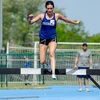The first crop of freshmen in the new Interdisciplinary Studies major in Sport Management and Exercise Science at the State University of New York at Fredonia entered classes earlier this semester, marking an important step in the development of a program that has captured the attention of a growing segment of students in recent years.
Fourteen students are currently majoring in Sport Management and Exercise Science, a program created through the Department of Interdisciplinary Studies in response to the popularity of the Sports and Exercise Studies minor. With 80 students, Sports and Exercise Studies is one of the largest minors at SUNY Fredonia.
"In the last few years, we’ve seen a lot of interest from our students, particularly those in our intramural programs and athletic programs," said Dr. Charles Davis, chair of the Department of Health, Wellness and Recreation. Dr. Davis and Dr. Bruce Klonsky of the Department of Psychology are coordinators of the new field of study. "They’ve been asking when this is going to become a major, and we feel this is the first step towards accommodating their educational interests."
Students pursuing a Bachelor of Science degree in Sport Management and Exercise Science can focus their efforts towards one of three specific tracks: Sport Management, Exercise Science, or Sport and Exercise Psychology. These areas of study can help prepare students for future careers in such fields as sports administration, program manager, sports journalist, sports agent, and physical fitness trainer, to name a few.
The Sport Management track requires students to concentrate on such topics as management and leadership, ethics, marketing, communication, budget, finance, law, economics, and governance. Individuals must also consider the social and cultural dimensions of sport management and participate in an approved field experience. The Sport Management track follows guidelines established by the North American Society for Sport Management.
The Exercise Sciences track requires prospective majors to establish a foundation in science, learn about exercise prescription for normal and special populations and explore topics related to health promotion. An internship or independent study experience is also required. The Exercise Science track follows guidelines established by the National Association for Sport and Physical Education.
The Sport and Exercise Psychology track requires interested individuals to learn about such topics as scientific and health ethics and standards, the contents of disciplines such as sport psychology, exercise psychology, kinesiology and the factors that affect sport and exercise performance(e.g. social, developmental, and personality). An applied experience involving an internship or independent study is required. The Sport and Exercise Psychology track follows guidelines established by the Association for the Advancement of Applied Sport Psychology.
Fourteen students are currently majoring in Sport Management and Exercise Science, a program created through the Department of Interdisciplinary Studies in response to the popularity of the Sports and Exercise Studies minor. With 80 students, Sports and Exercise Studies is one of the largest minors at SUNY Fredonia.
"In the last few years, we’ve seen a lot of interest from our students, particularly those in our intramural programs and athletic programs," said Dr. Charles Davis, chair of the Department of Health, Wellness and Recreation. Dr. Davis and Dr. Bruce Klonsky of the Department of Psychology are coordinators of the new field of study. "They’ve been asking when this is going to become a major, and we feel this is the first step towards accommodating their educational interests."
Students pursuing a Bachelor of Science degree in Sport Management and Exercise Science can focus their efforts towards one of three specific tracks: Sport Management, Exercise Science, or Sport and Exercise Psychology. These areas of study can help prepare students for future careers in such fields as sports administration, program manager, sports journalist, sports agent, and physical fitness trainer, to name a few.
The Sport Management track requires students to concentrate on such topics as management and leadership, ethics, marketing, communication, budget, finance, law, economics, and governance. Individuals must also consider the social and cultural dimensions of sport management and participate in an approved field experience. The Sport Management track follows guidelines established by the North American Society for Sport Management.
The Exercise Sciences track requires prospective majors to establish a foundation in science, learn about exercise prescription for normal and special populations and explore topics related to health promotion. An internship or independent study experience is also required. The Exercise Science track follows guidelines established by the National Association for Sport and Physical Education.
The Sport and Exercise Psychology track requires interested individuals to learn about such topics as scientific and health ethics and standards, the contents of disciplines such as sport psychology, exercise psychology, kinesiology and the factors that affect sport and exercise performance(e.g. social, developmental, and personality). An applied experience involving an internship or independent study is required. The Sport and Exercise Psychology track follows guidelines established by the Association for the Advancement of Applied Sport Psychology.



